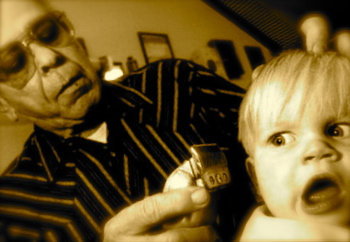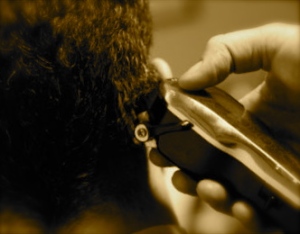Bad Hair Day
 When I was a little kid, my Mom used to cut our hair. Once a month, one by one, we would sit at the kitchen table as Mom took the buzzer to me and my three brothers. The humming, bee-like sound of a hair trimmer around my ears still makes me flinch to this day. Overtly, it was one of her many ways of saving money. Covertly, I believe it was her way of making us sit still while she dished out a half hour of roll-your-eyes motherly advice.
When I was a little kid, my Mom used to cut our hair. Once a month, one by one, we would sit at the kitchen table as Mom took the buzzer to me and my three brothers. The humming, bee-like sound of a hair trimmer around my ears still makes me flinch to this day. Overtly, it was one of her many ways of saving money. Covertly, I believe it was her way of making us sit still while she dished out a half hour of roll-your-eyes motherly advice.
Of course, no two haircuts were exactly alike. In fact, every haircut was a proof theorem in non-symmetrical geometry. I’m not exaggerating. Just look at my yearly school pictures.
I still remember one particularly bad haircut Mom gave to my younger brother, Marcel. Not only was it lopsided, it was way too short. In a fit of exasperation, he stormed off the kitchen chair crying, and locked himself in the bathroom. Of course, me being the peacekeeper, I knocked and knocked on the door until he reluctantly let me in. I still remember standing beside him, as he gazed blankly in the mirror, tears welling in his eyes. I kept trying to think of a compliment to tell him to make him feel better, but there just wasn’t a single compliment on his head. So I walked out. I figured, that haircut was really, really worth crying about.
By the time we were teenagers, my Dad had bridled my Mom’s enthusiasm for these monthly haircuts. In his opinion, if we wanted to keep our hair long, that was our choice. Which was quite an empowering thing to hear from your Dad. Of course, my Dad was bald, so I suppose he figured that, if you’ve got it, flaunt it. And so through the end of high school, I had kind of a semi-feathered David Cassidy look. My hair was so long I could reach under my arm and behind my back and touch my hair. I was like Samson—don’t mess with the hair.
These days, my hair is not such a big deal to me as it was when I was a teenager. It doesn’t matter so much now that my hair doesn’t look perfect, or it hangs a little weird. And I think the reason why is because I don’t see my hair as a reflection of me anymore. I’ve grown up beyond the teenage angst of appearance and image management.
I think this is the way with artists as well. So many artists (musicians, painters, writers, etc.) not only struggle with the making of their art (because making good art is hard), but they also struggle with attaching their identity to their art. In other words, they believe that the art they create is a reflection of who they are. And on one level, that is entirely true. But for the Christ-following artist, who we truly are is defined more by God than by us. Our identity is in Christ. And thus, our art is more a function of our ability to reflect who we are.
 This is a subtle but profound paradigm. When you believe that your art is who you are, then you receive the accolades, indifference, and criticisms of your art as a very personal thing. They like my art, and therefore they like me. Or they hate my art, and therefore they hate me. And if you believe this, your motivations for your art can become—in convoluted and somewhat tormented ways—simply a way to please people.
This is a subtle but profound paradigm. When you believe that your art is who you are, then you receive the accolades, indifference, and criticisms of your art as a very personal thing. They like my art, and therefore they like me. Or they hate my art, and therefore they hate me. And if you believe this, your motivations for your art can become—in convoluted and somewhat tormented ways—simply a way to please people.
But if you instead believe that your art is a process toward learning to express who you are, then you receive the accolades, indifference, and criticisms in a completely different way. To use the metaphor, we aren’t crushed by bad hair days. Because the condition of our hair is not indicative of the condition of our heart. We are free to take the compliments and complaints and learn from them or ignore them, free to take chances with our art, free to stretch the boundaries of our expression without feeling the sting of rejection.
It’s been my lifelong experience that it is only when I surrender a thing that I can truly receive it (Matthew 16:25, Psalm 27:4) . It has been true of my career, my marriage and family, my aspirations and dreams, and even my art. As artists, we must continually apply ourselves to the process of surrendering our art—or more specifically, disconnecting our identity from what it is we create. It is only then that you can experience the true freedom and joy that comes from creating art.
[Note: Please subscribe to my blog using the subscription box in the sidebar. You’ll get updates whenever a new blog pops up!]





